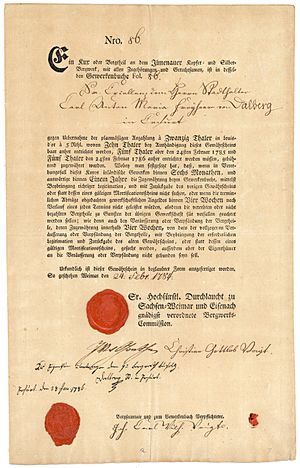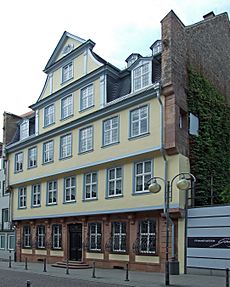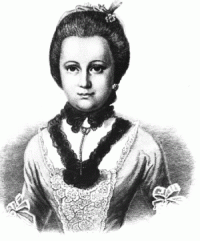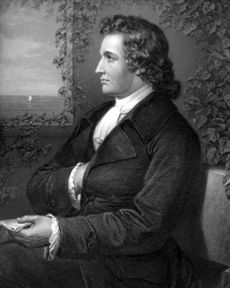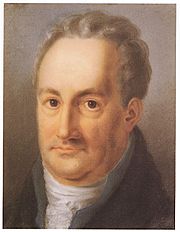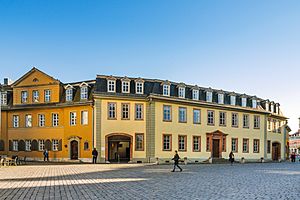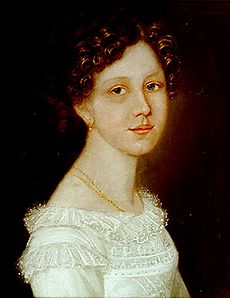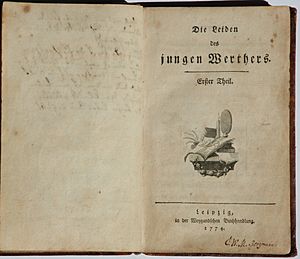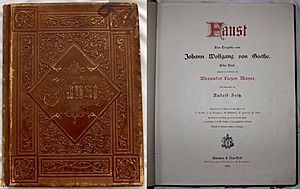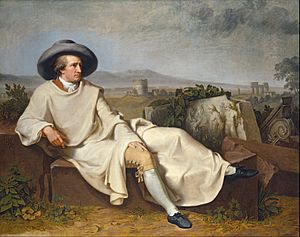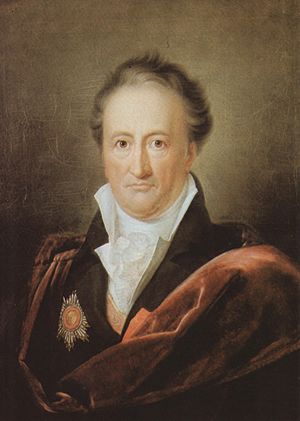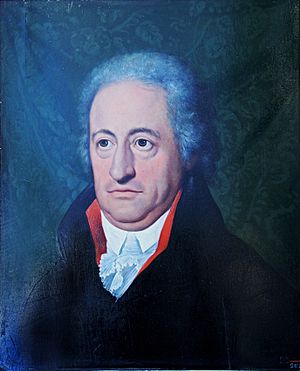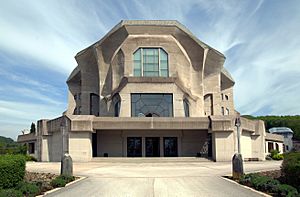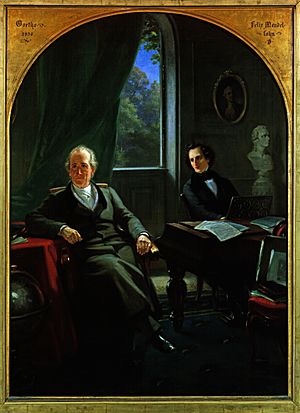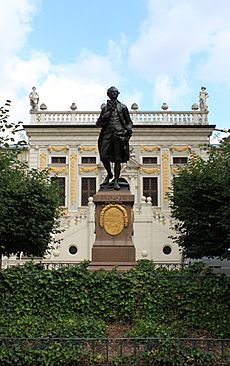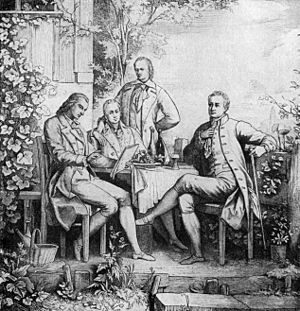Johann Wolfgang von Goethe facts for kids
Quick facts for kids
Geheimrat
Johann Wolfgang von Goethe
|
|
|---|---|
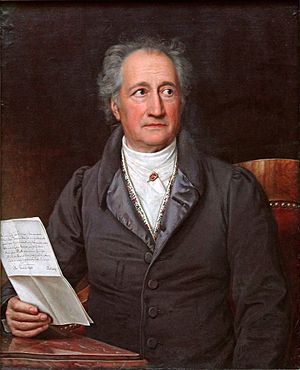
Goethe in 1828, by Joseph Karl Stieler
|
|
| Born | Johann Wolfgang Goethe 28 August 1749 Free Imperial City of Frankfurt, Holy Roman Empire |
| Died | 22 March 1832 (aged 82) Weimar, Grand Duchy of Saxe-Weimar-Eisenach, German Confederation |
| Occupation | Poet, novelist, playwright, natural philosopher, diplomat, civil servant |
| Education |
|
| Literary movement |
|
| Notable works |
|
| Spouse |
Christiane Vulpius
(m. 1806; died 1816) |
| Children | 5 (4 died young), including August von Goethe |
| Parents |
|
| Relatives | Cornelia Schlosser (sister) Christian August Vulpius (brother-in-law) Johann Georg Schlosser (brother-in-law) Ottilie von Goethe (daughter-in-law) Walther von Goethe (grandson) |
| Signature | |
 |
|
Johann Wolfgang von Goethe (born August 28, 1749 – died March 22, 1832) was a famous German writer and scientist. He wrote many plays, poems, and novels. He also studied nature and colors. Many people think he was the most important writer in the German language. His ideas have greatly influenced Western literature and philosophy since the late 1700s.
Goethe moved to Weimar in 1775. This happened after his first novel, The Sorrows of Young Werther (1774), became very popular. The Duke of Saxe-Weimar, Karl August, made Goethe a nobleman in 1782. Goethe was part of the Sturm und Drang (Storm and Stress) literary movement. In Weimar, he worked for the Duke's government. He helped manage mines and improve the University of Jena. He also helped design Weimar's botanical park.
Goethe's first big science book, Metamorphosis of Plants, came out after he visited Italy in 1788. In 1791, he became the director of the Weimar theater. In 1794, he became good friends with the writer Friedrich Schiller. Goethe put on Schiller's plays until Schiller died in 1805. During this time, Goethe published his second novel, Wilhelm Meister's Apprenticeship. He also wrote the epic poem Hermann and Dorothea. In 1808, the first part of his most famous play, Faust, was published. His work with Schiller and other thinkers is known as Weimar Classicism.
Many famous people admired Goethe. The philosopher Arthur Schopenhauer called Wilhelm Meister's Apprenticeship one of the four greatest novels ever. The American writer Ralph Waldo Emerson saw Goethe as one of six "representative men." Goethe's talks and ideas were written down in books like Conversations with Goethe. Many composers, like Mozart and Beethoven, set his poems to music.
Contents
A Look at Goethe's Life
Growing Up in Frankfurt
Goethe's father, Johann Caspar Goethe, lived in a big house in Frankfurt. Frankfurt was then a free city in the Holy Roman Empire. His father had studied law but did not work in the city's government. Johann Caspar married Goethe's mother, Catharina Elisabeth Goethe, in 1748. She was 17 and he was 38. Only Johann Wolfgang and his sister Cornelia lived past childhood.
Goethe's father and private teachers taught him many subjects. He learned languages like Latin, Greek, French, Italian, and English. He also took lessons in dancing, riding horses, and fencing. His father wanted his children to have all the chances he didn't.
Goethe loved drawing, but he soon became very interested in literature. He enjoyed reading works by Friedrich Gottlieb Klopstock and Homer. He also loved theater and puppet shows held at his home. These puppet shows later became a theme in his book Wilhelm Meister's Apprenticeship.
He also enjoyed reading books about history and religion. Goethe met actors in Frankfurt. He wrote early poems about a girl named Gretchen, who later appeared in his play Faust.
Studying Law and Early Writings
Goethe studied law at Leipzig University from 1765 to 1768. He didn't like learning old legal rules. Instead, he preferred classes with the poet Christian Fürchtegott Gellert. In Leipzig, Goethe fell in love with Anna Katharina Schönkopf. He wrote happy poems about her. In 1770, he secretly released his first poetry collection, Annette.
He became interested in writers like Gotthold Ephraim Lessing. Goethe wrote many things but kept only a few, like the comedy Die Mitschuldigen. The restaurant Auerbachs Keller and its story of Johann Georg Faust's barrel ride impressed him. This place became the only real setting in his play Faust Part One. Since his studies weren't going well, Goethe went back to Frankfurt in 1768.
Goethe became very sick in Frankfurt. His relationship with his father worsened during this time. His mother and sister took care of him. In April 1770, Goethe left Frankfurt to finish his studies at the University of Strasbourg.
In Alsace, Goethe felt much better. He loved the warm, wide Rhine area. In Strasbourg, Goethe met Johann Gottfried Herder. They became close friends. Herder helped Goethe become interested in William Shakespeare and folk poetry. Goethe later held a "Shakespeare Day" in his home. He said meeting Shakespeare's works was a personal awakening.
Goethe fell in love with Friederike Brion in October 1770. He ended the relationship in August 1771. Many of his poems, like "Willkommen und Abschied," came from this time.
In August 1771, Goethe earned his law degree from Strasbourg. He started a small law office in Frankfurt. He wanted to make law more humane. But he was too forceful in his first cases and lost them. This ended his law career quickly. Around this time, Goethe met people from the court of Darmstadt. He became friends with Johann Georg Schlosser (who later married Goethe's sister).
Goethe also started writing more. His father even helped him. Goethe found a story about a noble highwayman from the German Peasants' War. In a few weeks, he turned it into a play called Götz von Berlichingen. This play was very popular.
Goethe couldn't make enough money as a writer. In May 1772, he started practicing law again in Wetzlar. In 1774, he wrote The Sorrows of Young Werther. This book made him famous worldwide. The story was inspired by his experiences in Wetzlar. He knew Charlotte Buff and her fiancé, Johann Christian Kestner. He also used details from the death of his friend Karl Wilhelm Jerusalem. The book was a huge success, but Goethe didn't earn much money from it. This was because copyright laws didn't really exist back then.
Life in Weimar
In 1775, Goethe was invited to the court of Karl August, Duke of Saxe-Weimar-Eisenach. Goethe was 26, and Karl August was 18. Goethe moved to Weimar and lived there for the rest of his life. He held many important jobs for the Duke. He was the head of the ducal library and the Duke's main advisor.
In 1776, Goethe became close friends with Charlotte von Stein. She was an older, married woman. Their friendship lasted ten years. Then, Goethe suddenly left for Italy without telling her. She was very upset, but they later became friends again.
Goethe also became a close friend to Duke Karl August. He joined in court activities. His first ten years in Weimar gave him many new experiences. In 1779, Goethe joined the War Commission of the Grand Duchy of Saxe-Weimar. He also worked on commissions for mines and roads. In 1782, he became the acting head of the Duchy's treasury. This job made him almost like a prime minister. Goethe became a nobleman in 1782, which is why "von" was added to his name. That same year, he moved into the house in Weimar where he would live for the next 50 years.
Travels to Italy
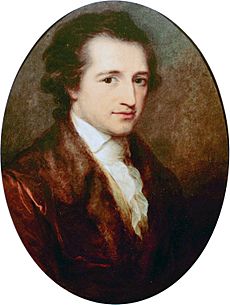
Goethe's trip to Italy and Sicily from 1786 to 1788 was very important for his ideas about art and life. His father had made a similar trip, which inspired Goethe. Also, the work of Johann Joachim Winckelmann made people interested in ancient Greek and Roman art again. So, Goethe's trip was like a special journey to see these old artworks. In Italy, Goethe met artists like Angelica Kauffman and Johann Heinrich Wilhelm Tischbein.
He also visited Sicily. He wrote that "To have seen Italy without having seen Sicily is to not have seen Italy at all." In Southern Italy and Sicily, Goethe saw real Greek buildings for the first time. He was surprised by how simple they were.
Goethe's notes from this trip became the book Italian Journey. This book only covers the first year of his visit. The rest of his time in Italy, mostly spent in Venice, is not well documented. After it was published in 1816, Italian Journey inspired many young Germans to travel to Italy.
Later Years in Weimar
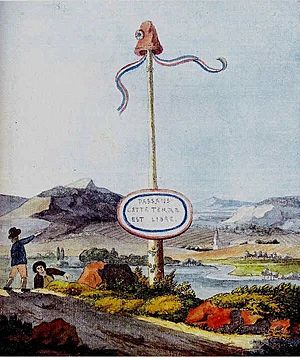
In late 1792, Goethe joined the Battle of Valmy against revolutionary France. He helped Duke Carl August during the failed invasion. He also observed the Siege of Mainz. He wrote about these events in his collected works.
In 1794, Friedrich Schiller wrote to Goethe and offered friendship. They had known each other since 1788 but were not close. This friendship lasted until Schiller died in 1805.
In 1806, Goethe lived in Weimar with Christiane Vulpius and their son August von Goethe. On October 13, Napoleon's army invaded the town. A few days later, on October 19, 1806, Goethe married Christiane. They had been together for 18 years. They had several children, but only their son, August, lived to adulthood. August's wife, Ottilie von Pogwisch, took care of the elder Goethe until he died in 1832. Christiane von Goethe died in 1816. Goethe once said, "There is nothing more charming to see than a mother with her child in her arms."
After 1793, Goethe mostly focused on writing. In 1821, after a serious heart illness, Goethe fell in love with Ulrike von Levetzow. Their last meeting in Carlsbad in 1823 inspired his poem "Marienbad Elegy." He thought it was one of his best works.
In 1821, Goethe's friend Carl Friedrich Zelter introduced him to 12-year-old Felix Mendelssohn. Mendelssohn visited Goethe many times and set some of Goethe's poems to music.
Goethe's Death
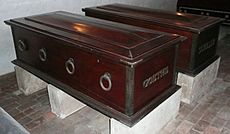
Goethe died in Weimar in 1832, likely from heart failure. His doctor said his last words were, Mehr Licht! (More light!). But this is not certain as the doctor was not in the room. He is buried in the Ducal Vault in Weimar.
The first performance of Richard Wagner's opera Lohengrin happened in Weimar in 1850. The conductor, Franz Liszt, chose August 28 for the date. This was to honor Goethe, who was born on August 28, 1749.
Goethe's Family
Goethe married Christiane Vulpius in 1806. They had five children, but only their oldest son, August von Goethe, lived to be an adult. August had three children with Ottilie von Goethe: Walther von Goethe, Wolfgang, and Alma. Alma died from Typhoid fever before her 17th birthday. Walther and Wolfgang never married or had children. Walther's gravestone says: "With him ends Goethe's dynasty." This means Goethe's direct family line ended with him. However, his siblings do have descendants.
Famous Literary Works
Goethe's most important early works were Götz von Berlichingen (1773) and The Sorrows of Young Werther (1774). Götz was a tragedy that first made him known. Werther made him hugely famous during the Sturm und Drang period. This period was an early part of Romanticism. Werther is often seen as the start of this movement and was one of the world's first "best-sellers."
Before he met Schiller in 1794, Goethe started Wilhelm Meister's Apprenticeship. He also wrote plays like Iphigenie auf Tauris, Egmont, and Torquato Tasso. He also wrote the fable Reineke Fuchs.
During his friendship with Schiller, he continued Wilhelm Meister's Journeyman Years. He also wrote the poem Hermann and Dorothea and the Roman Elegies. After Schiller's death in 1805, Goethe published Faust Part One (1808). Other works from this time include Elective Affinities (1809) and the West-Eastern Diwan (1819). This was a collection of poems in the Persian style. His autobiography, From My Life: Poetry and Truth, was published between 1811 and 1833. It covers his early life up to his move to Weimar. His Italian Journey (1816–17) also came out then. Faust, Part Two was finished just before he died in 1832 and published after his death.
Goethe was very interested in Abhijñānaśākuntalam by Kalidasa. This was one of the first works of Sanskrit literature known in Europe.
Goethe's epic play Faust was completed in parts. The first part came out in 1808 and was a huge hit. Goethe finished Faust Part Two in the year he died. An earlier version, called Urfaust, was also published after his death.
The first opera based on Goethe's Faust was by Louis Spohr in 1814. Many other composers, like Schumann and Berlioz, also created music inspired by Faust. The story of selling one's soul to the devil became very important in literature. It showed the idea of technology winning, but at a human cost.
Goethe's poems were a model for German poetry. His words inspired many composers. Perhaps the most famous is "Mignon's Song." It starts with a famous line about Italy: "Kennst du das Land, wo die Zitronen blühn?" ("Do you know the land where the lemon trees bloom?").
Many of Goethe's sayings are still used today. For example, "Enjoy when you can, and endure when you must." Lines from Faust have also become common German phrases. Some quotes, like "Art is long, life is short," are often wrongly linked to Goethe. This quote actually comes from Hippocrates.
Scientific Discoveries
Even though he is best known for his writing, Goethe was also very interested in science. He wrote books about how living things are shaped (morphology) and about color. In the 1790s, he did experiments with electricity and studied anatomy. He also had the largest private collection of minerals in Europe. By the time he died, he had collected 17,800 rock samples.
Goethe's studies on how living things are shaped influenced scientists in the 1800s. He discovered the human intermaxillary bone in 1784. This bone is also called "Goethe's bone." He found it by studying an elephant's skull. Other scientists had found it earlier, but Goethe was the first to prove it existed in all mammals. The elephant skull he used is still on display in Kassel, Germany.
During his trip to Italy, Goethe developed a theory about how plants change. He believed the basic form of a plant is found in its leaf. He wrote, "from top to bottom a plant is all leaf." In 1790, he published his book Metamorphosis of Plants. His ideas about plants came partly from his gardening in Weimar.
Goethe also helped make the Goethe barometer popular. This device measures air pressure. He studied weather a lot and kept records of barometer readings.
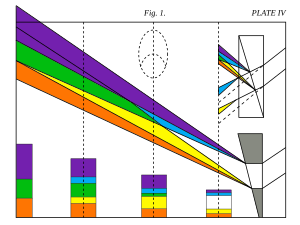
In 1810, Goethe published his Theory of Colours. He thought this was his most important work. He argued that color comes from light and darkness mixing through something cloudy. In 1816, Schopenhauer used Goethe's ideas to create his own color theory. When Goethe's theory was translated into English in 1840, artists like J. M. W. Turner adopted it. The philosopher Ludwig Wittgenstein was also inspired by Goethe's work.
Goethe strongly disagreed with Newton's ideas about color. Newton used math to explain color, but Goethe wanted to describe how colors appear. While Goethe's observations were accurate, his artistic approach was different from modern science. However, Goethe was the first to study how colors affect people. He noticed that colors opposite each other on his color wheel would make each other appear in the eye. This idea was similar to Ewald Hering's later opponent color theory.
The geologist Novalis believed Goethe was the best physicist of his time. He said Goethe's studies of light and plants were groundbreaking.
Beliefs and Politics
Goethe was a freethinker. He believed one could be Christian without following any specific church. He disagreed with many church teachings. He saw a big difference between Christ and Christian theology. He also criticized the church's history. His views on Christianity varied. Sometimes he seemed enthusiastic, other times he called himself "most decidedly non-Christian."
Goethe was born into a Lutheran family. Events like the 1755 Lisbon earthquake and the Seven Years' War made him question his early faith. He once wrote that he aimed to be like the Hypsistarians. This ancient group honored what they found best and most perfect, close to God. Because of his unusual religious beliefs, some people called him "the great heathen." They even opposed building a monument to him.
Goethe was interested in other religions, like Islam. At age 23, he wrote a poem called Mahomets Gesang ("Muhammad's Song"). In 1819, he published his West–östlicher Divan. This book aimed to create a poetic conversation between East and West.
Politically, Goethe called himself a "moderate liberal." He didn't like the extreme ideas of some politicians. He supported the careful liberalism of François Guizot. During the French Revolution, he thought students and professors were wasting their energy. He doubted that large groups of people could govern well. Goethe supported the American Revolution. He wrote a poem saying, "America, you're better off than our continent, the old." He didn't join the anti-Napoleon feelings of 1812. He also didn't like the strong nationalism that was starting to appear.
Goethe was a Freemason. He joined a lodge in Weimar in 1780. He often included Masonic ideas of universal brotherhood in his work. He was also interested in the Illuminati, a secret society. Goethe always refused requests to write poems that would stir up nationalist feelings.
Goethe's Lasting Influence
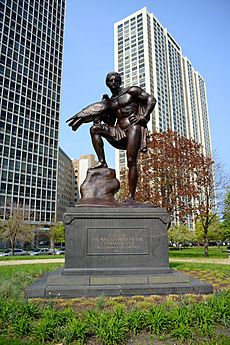
Goethe had a huge impact on the 1800s. He started many ideas that later became popular. He wrote many poems, essays, and criticisms. He also developed a theory of colors and did early work on evolution and linguistics. He loved mineralogy, and the mineral goethite is named after him. His non-fiction writings influenced many thinkers. These include Georg Wilhelm Friedrich Hegel and Arthur Schopenhauer. Along with Schiller, he was a main figure of Weimar Classicism.
Goethe's work showed many different styles of art. It could be very emotional or very formal. He believed Classicism helped control art, and that Romanticism was a "sickness." Yet, he wrote very emotional poetry and changed the rules of German poetry. Almost every major Austrian and German composer set his poems to music. His influence also reached French drama and opera. Beethoven said a "Faust" Symphony would be the greatest art. Liszt and Mahler both created symphonies inspired by Faust.
The play Faust is often called the drama of the Germans. It was written in two parts, published decades apart. It is his most famous work. Followers of the 20th-century thinker Rudolf Steiner built a theater called the Goetheanum after him. Faust is still performed there.
Goethe was also a cultural leader. When he met Napoleon in 1808, Napoleon famously said, "Vous êtes un homme" (You are a man!). They talked about politics and Goethe's Sorrows of Young Werther. Napoleon had read Werther seven times and loved it. Goethe was very impressed by Napoleon's intelligence. He always spoke of Napoleon with great respect.
Germaine de Staël wrote a book called De l'Allemagne (1813). She presented German Classicism and Romanticism as important for Europe. She called Goethe a living classic. She praised him for having "the chief characteristics of the German genius." Her book helped make Goethe a European cultural hero.
In Victorian England, Thomas Carlyle was a big fan of Goethe. He wrote essays introducing Goethe to English readers. He also translated some of Goethe's works. Goethe greatly influenced George Eliot. She saw Goethe as someone who helped people "rise to a lofty point of observation." She praised his "large tolerance." Matthew Arnold called Goethe the "Physician of the Iron Age" and "the clearest, the largest, the most helpful thinker of modern times."
Because of Goethe's fame, the city of Weimar was chosen in 1919 for the Weimar National Assembly. This assembly wrote a new constitution for Germany's Weimar Republic. Goethe became a key figure for Thomas Mann, who used Goethe's ideas to defend the republic. He highlighted Goethe's focus on individual growth, humanism, and global thinking.
Germany's cultural organization, the Goethe-Institut, is named after him. It promotes German language and culture around the world.
Goethe's writings in the Goethe and Schiller Archives were added to UNESCO's Memory of the World Register in 2001. This shows their historical importance.
Goethe's influence was strong because he understood changes in European feelings. People were focusing more on emotions and things that were hard to describe. He believed in personal control and thought too much emotion was bad. He praised Francis Bacon for his ideas about science based on experiments.
Goethe's scientific and artistic ideas were similar to those of Denis Diderot. Both disliked using only math to explain nature. Both saw the universe as always changing. Both believed art and science were linked by imagination.
Goethe's ideas on evolution helped shape the questions that Darwin and Wallace later explored. The inventor Nikola Tesla was greatly influenced by Goethe's Faust. He had memorized the whole play. While reciting a verse from Faust, he had the idea for the rotating magnetic field, which led to alternating current.
Books About Goethe
- The Life of Goethe by George Henry Lewes
- Goethe: The History of a Man by Emil Ludwig
- Goethe by Georg Brandes
- Goethe: His Life and Times by Richard Friedenthal
- Lotte in Weimar: The Beloved Returns by Thomas Mann
- Conversations with Goethe by Johann Peter Eckermann
- Goethe's World: as seen in letters and memoirs edited by Berthold Biermann
- Goethe: Four Studies by Albert Schweitzer
- Goethe Poet and Thinker by E.M. Wilkinson and L.A. Willoughby
- Goethe by T.J. Reed
- The Life of Goethe. A Critical Biography by John Williams
- Goethe: The Poet and the Age (2 Vols.), by Nicholas Boyle
See also
 In Spanish: Johann Wolfgang von Goethe para niños
In Spanish: Johann Wolfgang von Goethe para niños
- Young Goethe in Love (2010 film)
- Dora Stock – her meetings with the 16-year-old Goethe.
- Goethe Basin, a large crater on the planet Mercury
- Johann-Wolfgang-von-Goethe-Gymnasium
- "Nature", an essay often wrongly linked to Goethe
Awards named after him
- Goethe Awards
- Goethe Prize
- Hanseatic Goethe Prize
Works
- Johann Wolfgang von Goethe bibliography


